Case Study: Civil Liberties and the US Supreme Court Analysis
VerifiedAdded on 2023/05/30
|6
|1222
|117
Case Study
AI Summary
This case study explores the role of the U.S. Supreme Court in upholding civil liberties, focusing on the landmark case of District of Columbia v. Heller. The study examines how the Supreme Court's decisions extend and protect civil rights, even interpreting constitutional sections in novel ways. The analysis of District of Columbia v. Heller reveals the Court's stance on the Second Amendment and an individual's right to keep arms for self-defense. The case study concludes that the Supreme Court plays a crucial role in safeguarding civil liberties, providing avenues for citizens to address perceived violations and ensuring these rights are accessible to all.
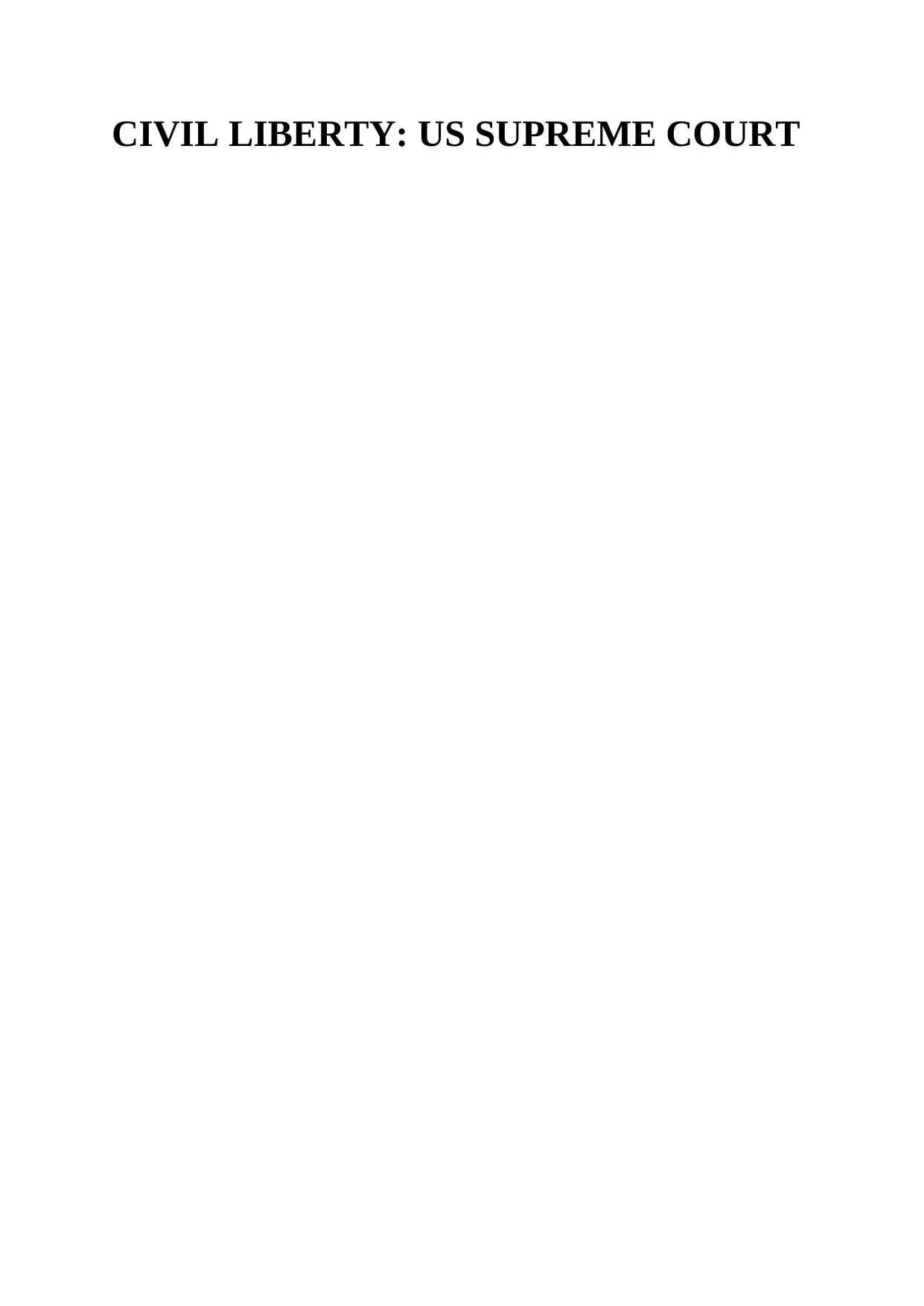
CIVIL LIBERTY: US SUPREME COURT
Paraphrase This Document
Need a fresh take? Get an instant paraphrase of this document with our AI Paraphraser
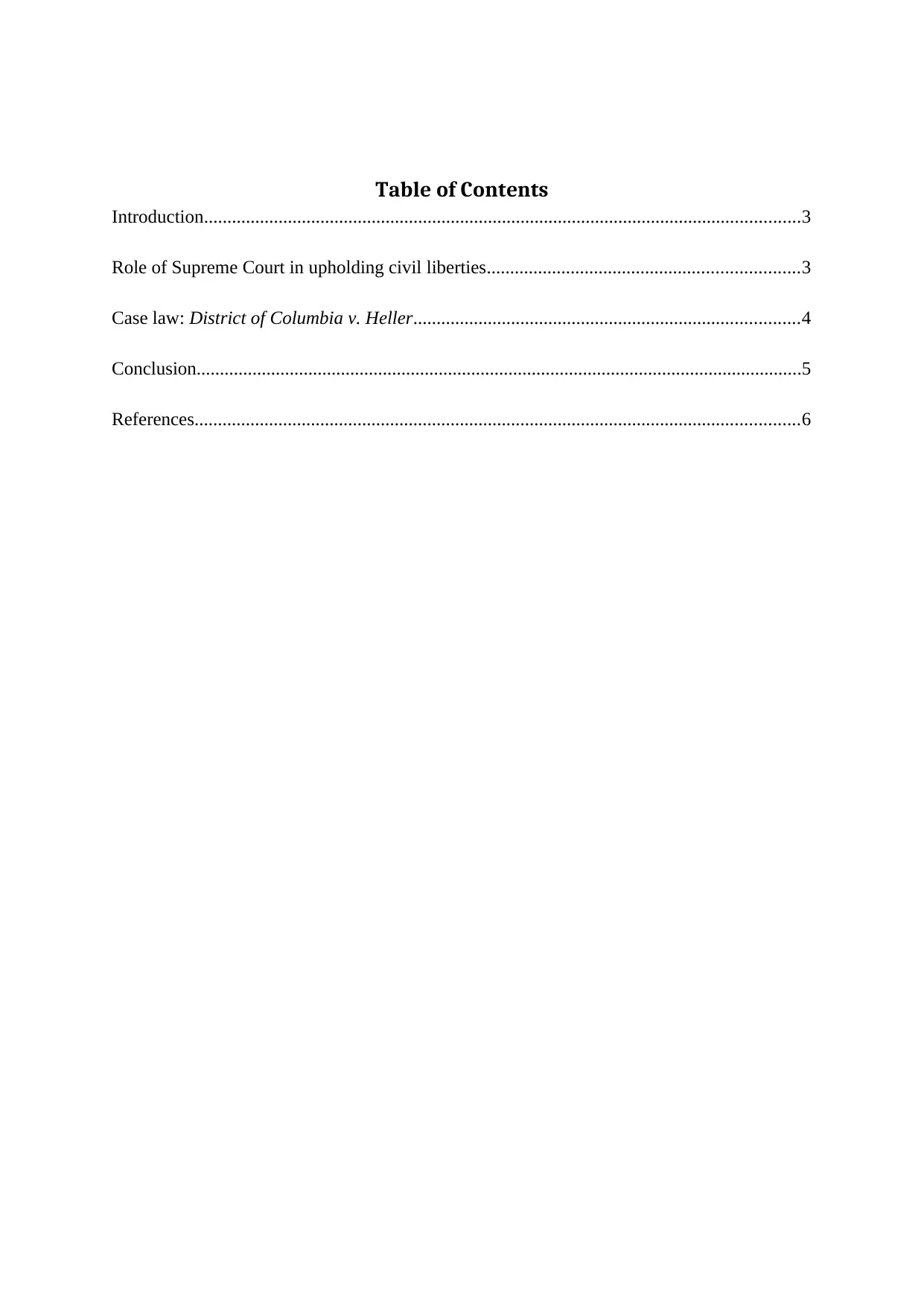
Table of Contents
Introduction................................................................................................................................3
Role of Supreme Court in upholding civil liberties...................................................................3
Case law: District of Columbia v. Heller...................................................................................4
Conclusion..................................................................................................................................5
References..................................................................................................................................6
Introduction................................................................................................................................3
Role of Supreme Court in upholding civil liberties...................................................................3
Case law: District of Columbia v. Heller...................................................................................4
Conclusion..................................................................................................................................5
References..................................................................................................................................6
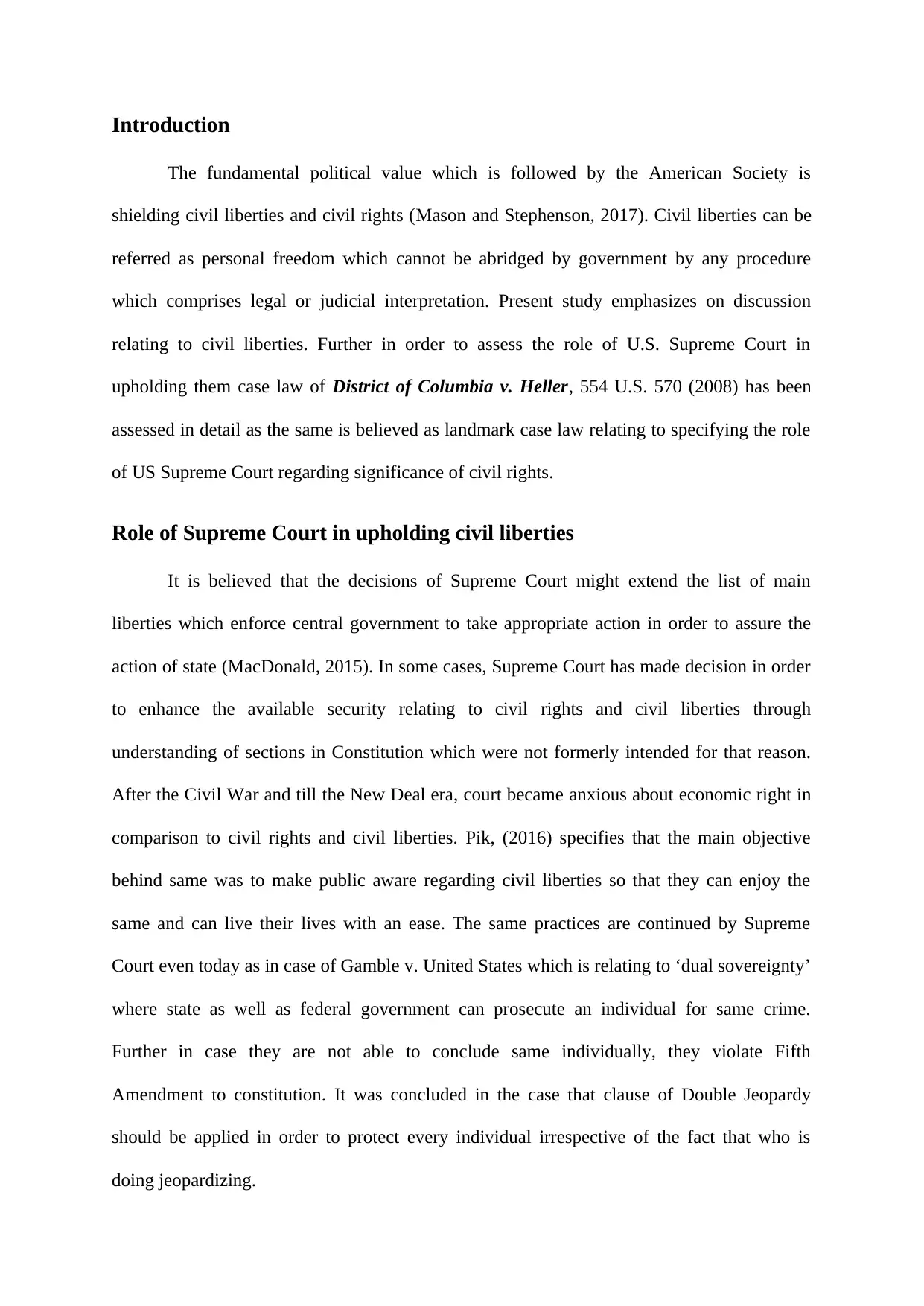
Introduction
The fundamental political value which is followed by the American Society is
shielding civil liberties and civil rights (Mason and Stephenson, 2017). Civil liberties can be
referred as personal freedom which cannot be abridged by government by any procedure
which comprises legal or judicial interpretation. Present study emphasizes on discussion
relating to civil liberties. Further in order to assess the role of U.S. Supreme Court in
upholding them case law of District of Columbia v. Heller, 554 U.S. 570 (2008) has been
assessed in detail as the same is believed as landmark case law relating to specifying the role
of US Supreme Court regarding significance of civil rights.
Role of Supreme Court in upholding civil liberties
It is believed that the decisions of Supreme Court might extend the list of main
liberties which enforce central government to take appropriate action in order to assure the
action of state (MacDonald, 2015). In some cases, Supreme Court has made decision in order
to enhance the available security relating to civil rights and civil liberties through
understanding of sections in Constitution which were not formerly intended for that reason.
After the Civil War and till the New Deal era, court became anxious about economic right in
comparison to civil rights and civil liberties. Pik, (2016) specifies that the main objective
behind same was to make public aware regarding civil liberties so that they can enjoy the
same and can live their lives with an ease. The same practices are continued by Supreme
Court even today as in case of Gamble v. United States which is relating to ‘dual sovereignty’
where state as well as federal government can prosecute an individual for same crime.
Further in case they are not able to conclude same individually, they violate Fifth
Amendment to constitution. It was concluded in the case that clause of Double Jeopardy
should be applied in order to protect every individual irrespective of the fact that who is
doing jeopardizing.
The fundamental political value which is followed by the American Society is
shielding civil liberties and civil rights (Mason and Stephenson, 2017). Civil liberties can be
referred as personal freedom which cannot be abridged by government by any procedure
which comprises legal or judicial interpretation. Present study emphasizes on discussion
relating to civil liberties. Further in order to assess the role of U.S. Supreme Court in
upholding them case law of District of Columbia v. Heller, 554 U.S. 570 (2008) has been
assessed in detail as the same is believed as landmark case law relating to specifying the role
of US Supreme Court regarding significance of civil rights.
Role of Supreme Court in upholding civil liberties
It is believed that the decisions of Supreme Court might extend the list of main
liberties which enforce central government to take appropriate action in order to assure the
action of state (MacDonald, 2015). In some cases, Supreme Court has made decision in order
to enhance the available security relating to civil rights and civil liberties through
understanding of sections in Constitution which were not formerly intended for that reason.
After the Civil War and till the New Deal era, court became anxious about economic right in
comparison to civil rights and civil liberties. Pik, (2016) specifies that the main objective
behind same was to make public aware regarding civil liberties so that they can enjoy the
same and can live their lives with an ease. The same practices are continued by Supreme
Court even today as in case of Gamble v. United States which is relating to ‘dual sovereignty’
where state as well as federal government can prosecute an individual for same crime.
Further in case they are not able to conclude same individually, they violate Fifth
Amendment to constitution. It was concluded in the case that clause of Double Jeopardy
should be applied in order to protect every individual irrespective of the fact that who is
doing jeopardizing.
⊘ This is a preview!⊘
Do you want full access?
Subscribe today to unlock all pages.

Trusted by 1+ million students worldwide
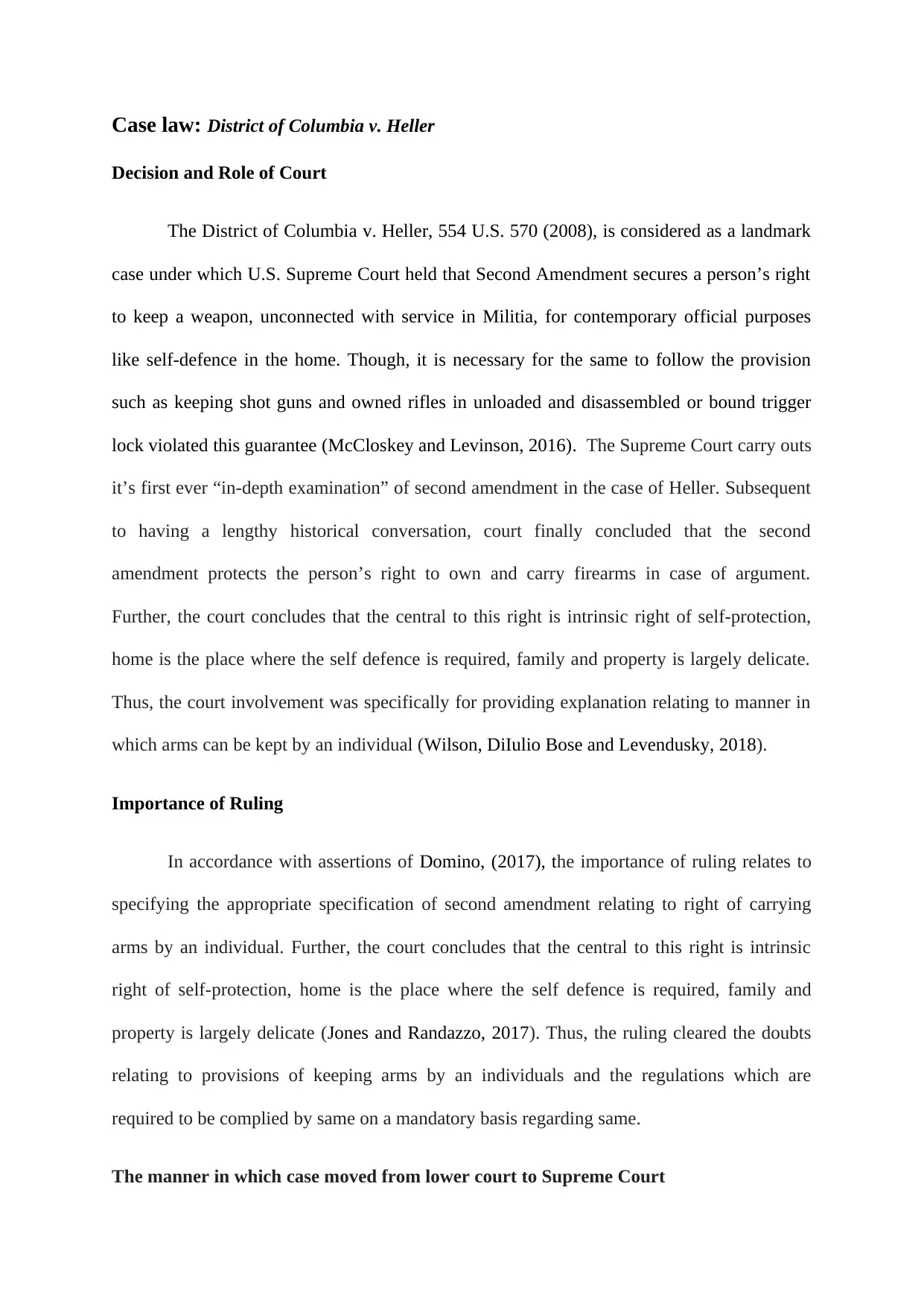
Case law: District of Columbia v. Heller
Decision and Role of Court
The District of Columbia v. Heller, 554 U.S. 570 (2008), is considered as a landmark
case under which U.S. Supreme Court held that Second Amendment secures a person’s right
to keep a weapon, unconnected with service in Militia, for contemporary official purposes
like self-defence in the home. Though, it is necessary for the same to follow the provision
such as keeping shot guns and owned rifles in unloaded and disassembled or bound trigger
lock violated this guarantee (McCloskey and Levinson, 2016). The Supreme Court carry outs
it’s first ever “in-depth examination” of second amendment in the case of Heller. Subsequent
to having a lengthy historical conversation, court finally concluded that the second
amendment protects the person’s right to own and carry firearms in case of argument.
Further, the court concludes that the central to this right is intrinsic right of self-protection,
home is the place where the self defence is required, family and property is largely delicate.
Thus, the court involvement was specifically for providing explanation relating to manner in
which arms can be kept by an individual (Wilson, DiIulio Bose and Levendusky, 2018).
Importance of Ruling
In accordance with assertions of Domino, (2017), the importance of ruling relates to
specifying the appropriate specification of second amendment relating to right of carrying
arms by an individual. Further, the court concludes that the central to this right is intrinsic
right of self-protection, home is the place where the self defence is required, family and
property is largely delicate (Jones and Randazzo, 2017). Thus, the ruling cleared the doubts
relating to provisions of keeping arms by an individuals and the regulations which are
required to be complied by same on a mandatory basis regarding same.
The manner in which case moved from lower court to Supreme Court
Decision and Role of Court
The District of Columbia v. Heller, 554 U.S. 570 (2008), is considered as a landmark
case under which U.S. Supreme Court held that Second Amendment secures a person’s right
to keep a weapon, unconnected with service in Militia, for contemporary official purposes
like self-defence in the home. Though, it is necessary for the same to follow the provision
such as keeping shot guns and owned rifles in unloaded and disassembled or bound trigger
lock violated this guarantee (McCloskey and Levinson, 2016). The Supreme Court carry outs
it’s first ever “in-depth examination” of second amendment in the case of Heller. Subsequent
to having a lengthy historical conversation, court finally concluded that the second
amendment protects the person’s right to own and carry firearms in case of argument.
Further, the court concludes that the central to this right is intrinsic right of self-protection,
home is the place where the self defence is required, family and property is largely delicate.
Thus, the court involvement was specifically for providing explanation relating to manner in
which arms can be kept by an individual (Wilson, DiIulio Bose and Levendusky, 2018).
Importance of Ruling
In accordance with assertions of Domino, (2017), the importance of ruling relates to
specifying the appropriate specification of second amendment relating to right of carrying
arms by an individual. Further, the court concludes that the central to this right is intrinsic
right of self-protection, home is the place where the self defence is required, family and
property is largely delicate (Jones and Randazzo, 2017). Thus, the ruling cleared the doubts
relating to provisions of keeping arms by an individuals and the regulations which are
required to be complied by same on a mandatory basis regarding same.
The manner in which case moved from lower court to Supreme Court
Paraphrase This Document
Need a fresh take? Get an instant paraphrase of this document with our AI Paraphraser
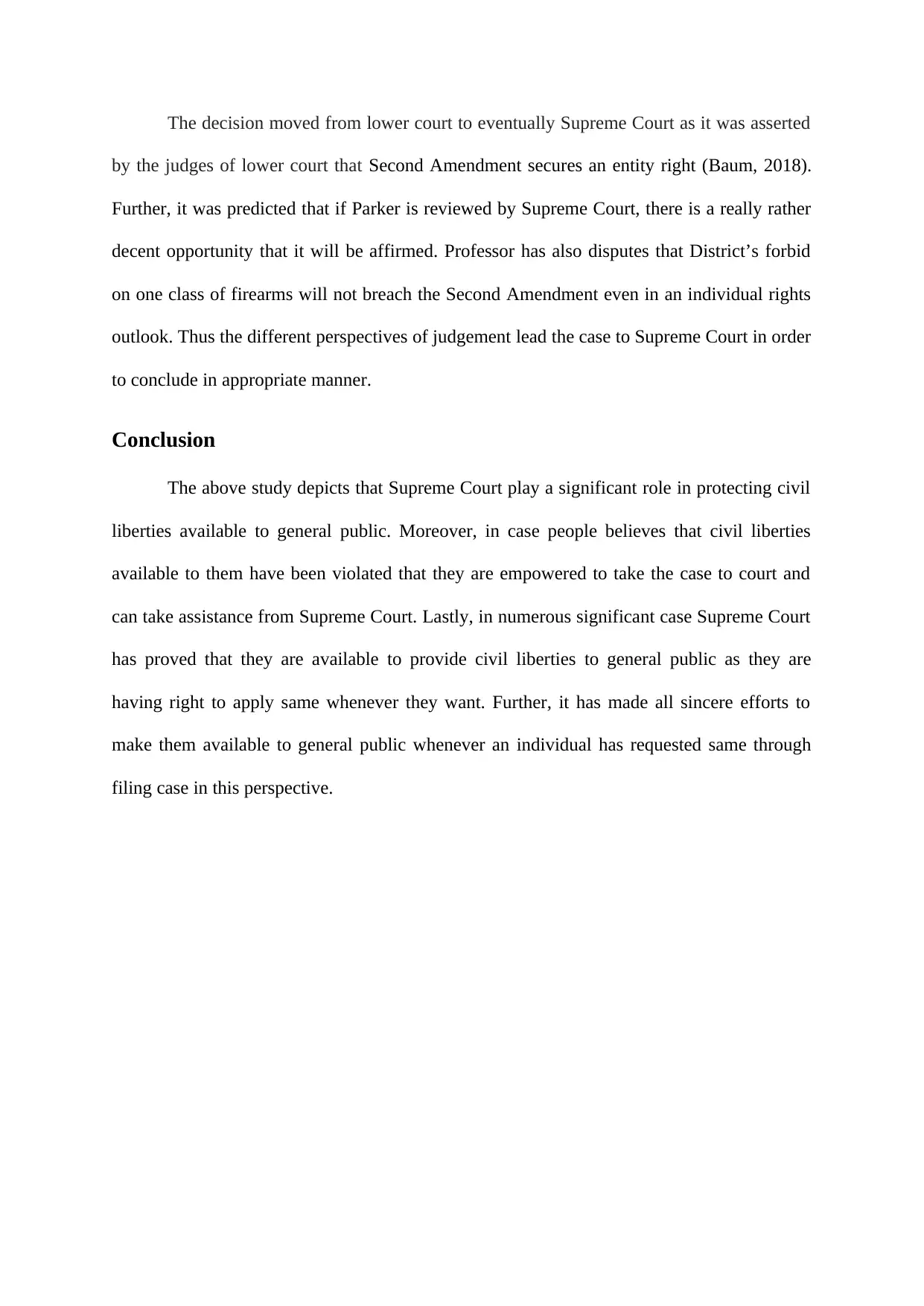
The decision moved from lower court to eventually Supreme Court as it was asserted
by the judges of lower court that Second Amendment secures an entity right (Baum, 2018).
Further, it was predicted that if Parker is reviewed by Supreme Court, there is a really rather
decent opportunity that it will be affirmed. Professor has also disputes that District’s forbid
on one class of firearms will not breach the Second Amendment even in an individual rights
outlook. Thus the different perspectives of judgement lead the case to Supreme Court in order
to conclude in appropriate manner.
Conclusion
The above study depicts that Supreme Court play a significant role in protecting civil
liberties available to general public. Moreover, in case people believes that civil liberties
available to them have been violated that they are empowered to take the case to court and
can take assistance from Supreme Court. Lastly, in numerous significant case Supreme Court
has proved that they are available to provide civil liberties to general public as they are
having right to apply same whenever they want. Further, it has made all sincere efforts to
make them available to general public whenever an individual has requested same through
filing case in this perspective.
by the judges of lower court that Second Amendment secures an entity right (Baum, 2018).
Further, it was predicted that if Parker is reviewed by Supreme Court, there is a really rather
decent opportunity that it will be affirmed. Professor has also disputes that District’s forbid
on one class of firearms will not breach the Second Amendment even in an individual rights
outlook. Thus the different perspectives of judgement lead the case to Supreme Court in order
to conclude in appropriate manner.
Conclusion
The above study depicts that Supreme Court play a significant role in protecting civil
liberties available to general public. Moreover, in case people believes that civil liberties
available to them have been violated that they are empowered to take the case to court and
can take assistance from Supreme Court. Lastly, in numerous significant case Supreme Court
has proved that they are available to provide civil liberties to general public as they are
having right to apply same whenever they want. Further, it has made all sincere efforts to
make them available to general public whenever an individual has requested same through
filing case in this perspective.
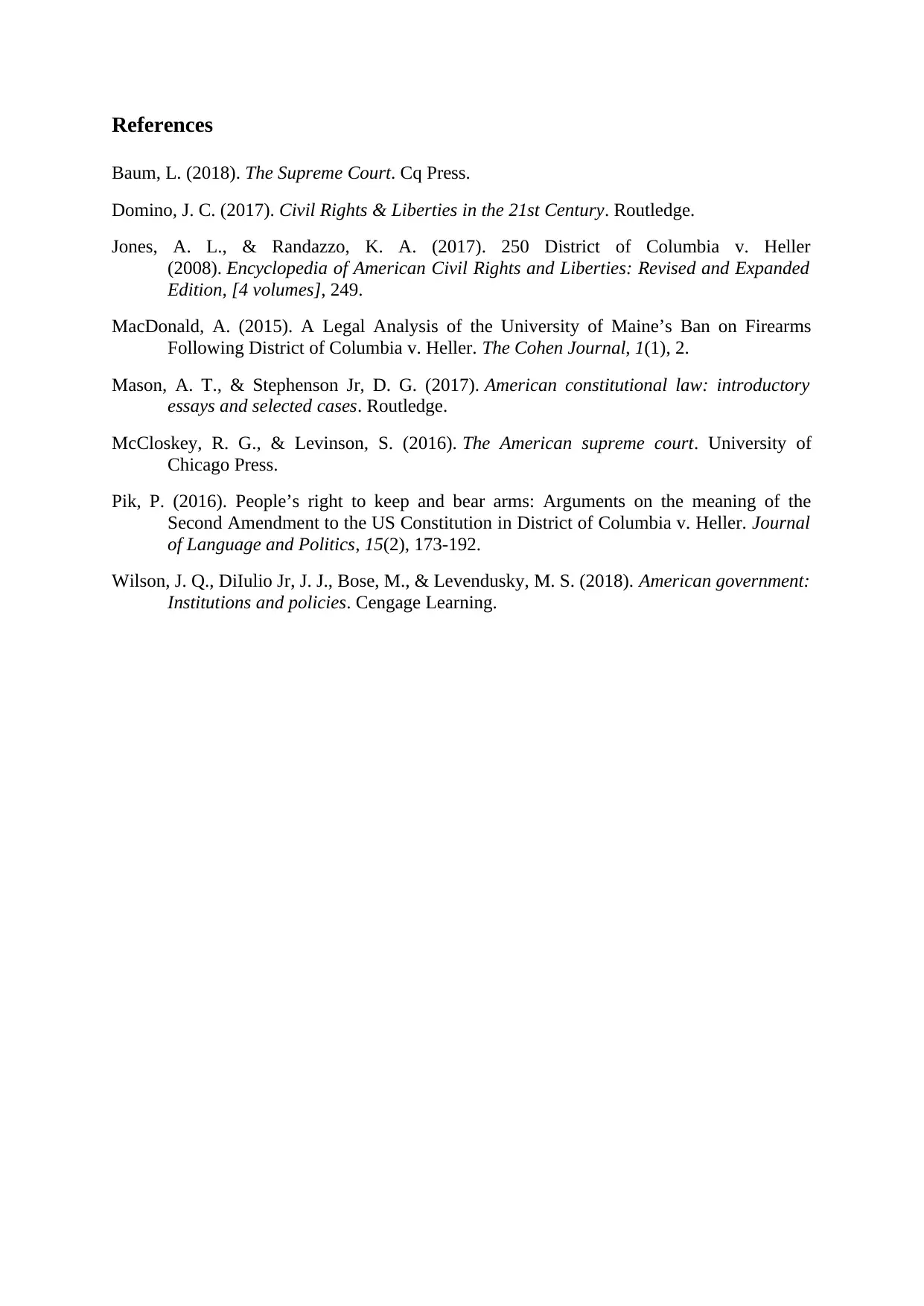
References
Baum, L. (2018). The Supreme Court. Cq Press.
Domino, J. C. (2017). Civil Rights & Liberties in the 21st Century. Routledge.
Jones, A. L., & Randazzo, K. A. (2017). 250 District of Columbia v. Heller
(2008). Encyclopedia of American Civil Rights and Liberties: Revised and Expanded
Edition, [4 volumes], 249.
MacDonald, A. (2015). A Legal Analysis of the University of Maine’s Ban on Firearms
Following District of Columbia v. Heller. The Cohen Journal, 1(1), 2.
Mason, A. T., & Stephenson Jr, D. G. (2017). American constitutional law: introductory
essays and selected cases. Routledge.
McCloskey, R. G., & Levinson, S. (2016). The American supreme court. University of
Chicago Press.
Pik, P. (2016). People’s right to keep and bear arms: Arguments on the meaning of the
Second Amendment to the US Constitution in District of Columbia v. Heller. Journal
of Language and Politics, 15(2), 173-192.
Wilson, J. Q., DiIulio Jr, J. J., Bose, M., & Levendusky, M. S. (2018). American government:
Institutions and policies. Cengage Learning.
Baum, L. (2018). The Supreme Court. Cq Press.
Domino, J. C. (2017). Civil Rights & Liberties in the 21st Century. Routledge.
Jones, A. L., & Randazzo, K. A. (2017). 250 District of Columbia v. Heller
(2008). Encyclopedia of American Civil Rights and Liberties: Revised and Expanded
Edition, [4 volumes], 249.
MacDonald, A. (2015). A Legal Analysis of the University of Maine’s Ban on Firearms
Following District of Columbia v. Heller. The Cohen Journal, 1(1), 2.
Mason, A. T., & Stephenson Jr, D. G. (2017). American constitutional law: introductory
essays and selected cases. Routledge.
McCloskey, R. G., & Levinson, S. (2016). The American supreme court. University of
Chicago Press.
Pik, P. (2016). People’s right to keep and bear arms: Arguments on the meaning of the
Second Amendment to the US Constitution in District of Columbia v. Heller. Journal
of Language and Politics, 15(2), 173-192.
Wilson, J. Q., DiIulio Jr, J. J., Bose, M., & Levendusky, M. S. (2018). American government:
Institutions and policies. Cengage Learning.
⊘ This is a preview!⊘
Do you want full access?
Subscribe today to unlock all pages.

Trusted by 1+ million students worldwide
1 out of 6
Related Documents
Your All-in-One AI-Powered Toolkit for Academic Success.
+13062052269
info@desklib.com
Available 24*7 on WhatsApp / Email
![[object Object]](/_next/static/media/star-bottom.7253800d.svg)
Unlock your academic potential
Copyright © 2020–2026 A2Z Services. All Rights Reserved. Developed and managed by ZUCOL.





